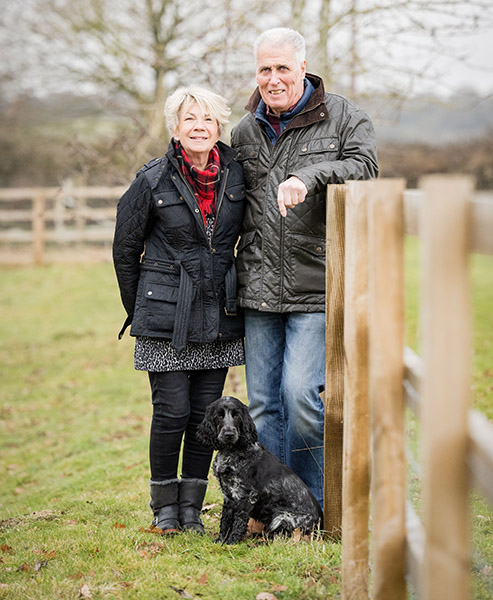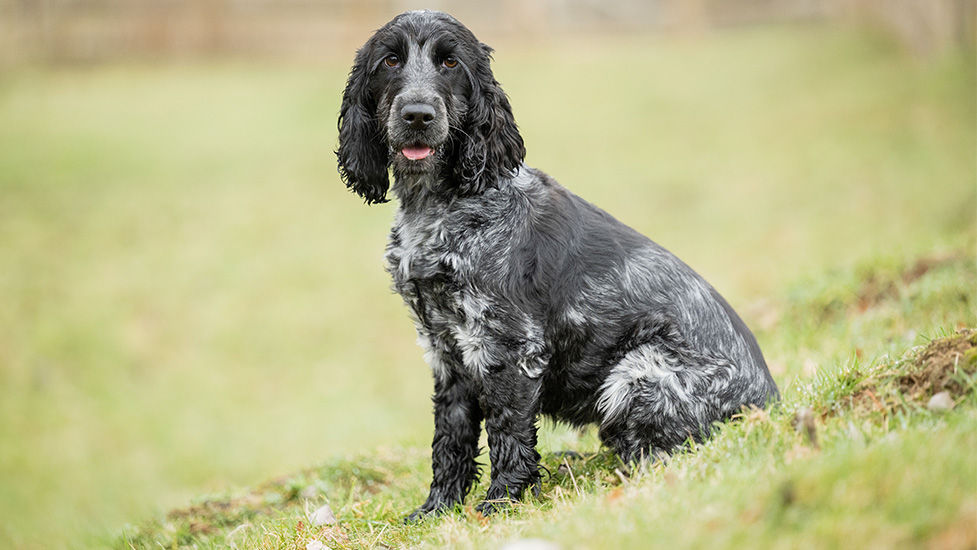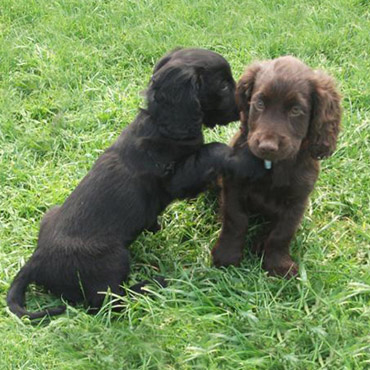Skye becomes Philip’s sound support superstar
Posted by Matt Sadler
For five years, married couple Philip and Rose, both 72, had been Volunteer Puppy Trainers at Hearing Dogs. Together, they cared for three puppies-in-training, Dexter, Oreo and Skye.
Now, their relationship with Skye has become even more special as she has begun working as Philip’s own sound support dog.

Philip’s hearing has been deteriorating for some time. Throughout his career, Philip worked in a motor workshop, being exposed to loud sounds daily, which he feels has contributed to his hearing loss. Although Philip has tried hearing aids, he has struggled to find ones that work for him.
“I do worry that if my wife’s away, I won’t hear the smoke alarm at night,” said Philip. “I see two of my mates regularly but I struggle to hear one of them because he’s very softly spoken. When we go in the car and he’s facing towards the front, I can’t hear him at all.”
During Skye’s training, Philip’s hearing loss was becoming more challenging. At the same time, Skye was mastering her sound-alert skills; the team at Hearing Dogs noticed there may be a great match in the making for the volunteer and trainee pup.
“Philip and Skye have always had a lovely bond and out of the dogs they have socialised, he always had a soft spot for Skye,” shared Charlotte, Philip and Skye’s Partnership Instructor.
So, with Skye’s skills and personality being a great fit for Philip’s needs, this clever and affectionate girl (who, according to Philip, also has a cheeky side!) graduated from puppy class pupil to Philips’ own sound support dog.
A reassuring nose boop
Being a sound support dog is a highly-skilled job. Sound support dogs are partnered with people with deteriorating or moderate hearing loss and alert them to life-saving and important sounds in the home, such as the fire alarm or the alarm clock. They don’t alert to sounds in public spaces or wear the burgundy jacket like hearing dogs do, but provide the same incredible friendship and emotional support.

“Skye is such a happy, bubbly character,” continued Charlotte. “It’s wonderful to see her so happy and relaxed with Rose and Philip and to see her transition to working for Philip. He never misses his phone ringing anymore, as he is welcomed with a nose boop, and he is reassured that when gardening or upstairs he won’t miss the doorbell.”
Philip continued, “I don’t always hear Rose when she’s speaking to me. So, we’re working on ‘the call’ so that if my hearing deteriorates further, Rose can ask Skye to fetch me and she’ll bring me to her.”
Skye the social butterfly
Skye has amazing skills, but her role as a sound support dog isn’t all about sounds. Her joyful and loving nature is supporting Philip’s mental wellbeing every day. Charlotte said, “Philip is still coming to terms with his hearing loss but having Skye gives him that boost of confidence to talk more openly about it and accept it more.”
“Skye and I have a strong bond. Having Skye means I have to walk every day, even when it’s pouring with rain, and afterwards I feel so much better,” said Philip. “You wouldn’t believe how many people I’ve got to know in my local woods through walking Skye.
“When I get home, my wife asks where I’ve been because I’ve been out so long. There’s one chap I’ve met who also used to be in the motor trade. We regularly meet up there and have a chat and we get on very well.”
“Rose and I both think the world of Skye. She’s a little darling. She’s changed our lives.”
What is a sound support dog?
Our sound support dogs are highly trained to alert deaf people to sounds in the home, but when they are out and about, they don’t wear a Hearing Dogs jacket and don’t accompany their deaf partner to places a pet dog wouldn’t be able to go.
Sometimes a dog gets to the end of their training and is excellent at alerting people to sounds in a home environment, but doesn’t necessarily thrive in certain other environments, such as busy town centres or on public transport. This could be because they get a bit too distracted by the hustle and bustle, or they just feel more comfortable in quieter situations.
We match sound support dogs to people with deteriorating hearing or moderate hearing loss who need to be reliably alerted to sounds within the home, but do not need a dog to accompany them everywhere they go.
If you think you may benefit from a sound support dog, please get in touch with our friendly team at applications@hearingdogs.org.uk.
Share this post with your friends
Psst! Don’t miss all the latest Hearing Dogs news…

You’ll get:
- Updates on how we train our dogs and how they change deaf people’s lives.
- A monthly dose of Cute Corner – a post dedicated to our adorable puppies!
- Behind-the-scenes stories and photos.
- News of upcoming events and ways you can help us create more hearing dogs.
